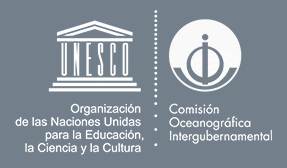Displaying 893 results.
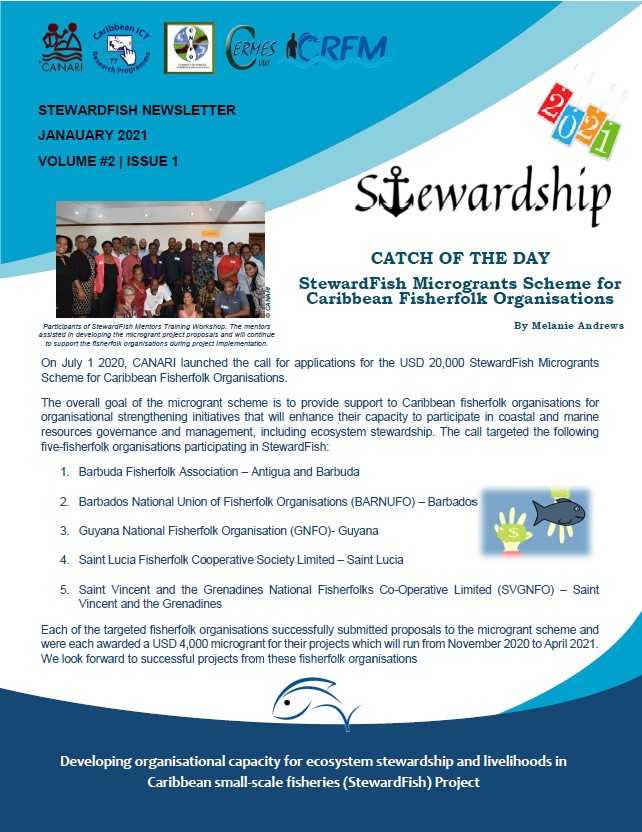
StewardFish Newsletter (StewardShip) Volume 2 Issue 1
“Stewardship” is a joint publication of the regional project partners for StewardFish. In this issue, we highlight our Microgrants Scheme for Caribbean Fisherfolk Organisations, our work in Gender and Ecosystem Approach to Fisheries (EAF). Also you may find of interest our ICT for Governance Training for NFOs.
Author: CANARI; CERMES; CIRP; CNFO; and CRFM
Year: 2021
Keywords: StewardFish fisheries
 4
4


 Report issue
Report issue
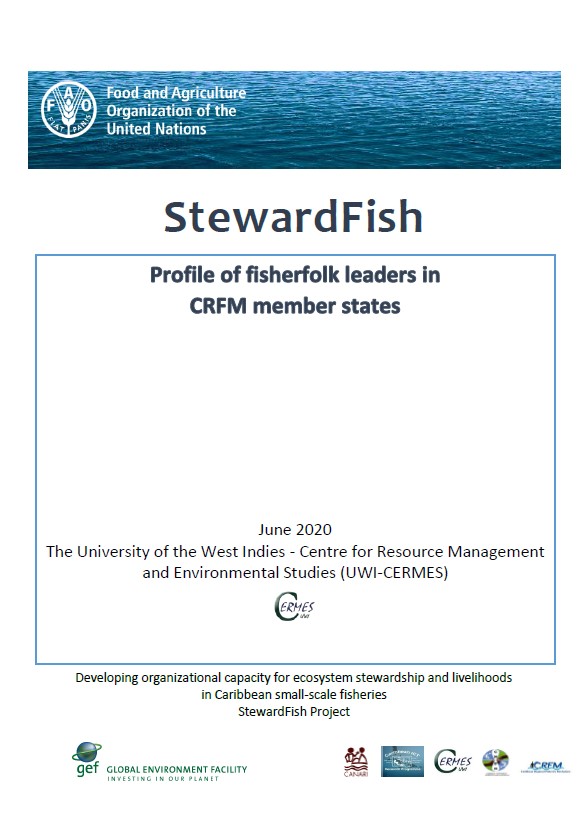
StewardFish Profile of fisherfolk leaders in CRFM Member States
Organizational leadership is one of the most important roles of both women and men in the fishing industry. Empowerment of fisherfolk organization and strengthening or development of their capacity, especially in relation to leadership, is important to the successful implementation of the 2014 Voluntary Guidelines for Securing Sustainable Small-Scale Fisheries in the Context of Food Security and Poverty Eradication (SSF Guidelines) and the realization of sustainable fisheries and stewardship. UWI-CERMES undertook fisherfolk organization leader assessments in fisherfolk organizations in each of five StewardFish project countries – Antigua and Barbuda, Saint Lucia, Barbados, St. Vincent and the Grenadines, and Belize – for developing a leadership profile to better understand gaps in leadership competencies in the region.
Thirty-six leaders (8 women and 28 men) were interviewed across twenty-one fisherfolk organizations of three governance level types (primary, national and regional). Fisherfolk organizations are male dominated. The findings of the leadership survey show that there are many more men than women in leadership roles in the fishing industry in CRFM Member States. Leadership in fisherfolk organizations tend to be held by mature women and men between the ages of 50-59 years old, and are predominantly devoid of youth. Both women and men first take up leadership positions in fisherfolk organizations in their mid- to late forties, but women assume leadership roles earlier than men; typically after being in the fishing industry for under ten years. On average men spend twice as long in leadership positions than women.
Leaders take on leadership roles for both altruistic and self-enhancing reasons. Fisherfolk organization leaders currently face and anticipate numerous and diverse challenges that are primarily internal or mainly organizational (?), and external due to shocks and pressures that provide potential threats to the success of fisherfolk organizations.
Good leadership of fisherfolk organizations is fundamentally important to the success of collective action of small-scale fishers in achieving local, national and even regional successes with respect to management, policy and stewardship in the fishing industry. Our work contributes to a baseline of knowledge on fisher organization leaders in the region. It confirms some already known information on fisherfolk organizations, documenting this and new information.
Author: CERMES
Year: 2020
Keywords: StewardFish; Capacity Building; Leadership Training and Capacity Building, fisheries, governance
 3
3


 Report issue
Report issue
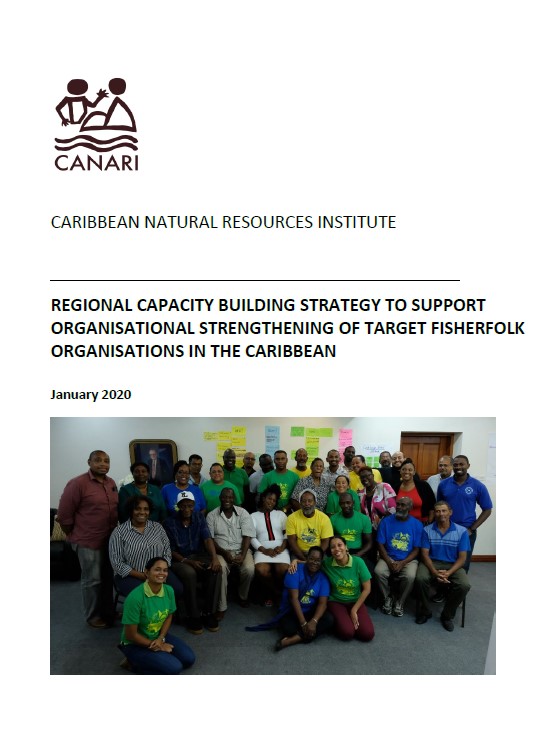
StewardFish Regional Capacity Building Strategy to Support Organizational Strengthening of Target Fisherfolk Organizations in the Caribbean
Building organizational capacity can be complex, dependent on several internal and external factors, and costly. Some capacities can be built in a relatively short period of time while other capacity areas require a medium- to long-term approach to be fully addressed. As such, this regional capacity building strategy recognizes that there is no one-size-fix-all approach and that StewardFish does not have all the resources or mandate to address all the organizational capacity needs identified in the FFOs.
The strategy for addressing some of the FFOs highest priority capacity needs therefore depends on a multidimensional approach supported by StewardFish, the Mentors, and the FFOs themselves.
StewardFish will employ the following strategies to deliver a tailored capacity building programme for the targeted FFOs:
1. training and coaching to enhance the capacity of Mentors to conduct organisational strengthening, who will in turn work directly with the targeted FFOs;
2. providing FFOs with tailored support for organizational capacity building through mentoring;
3. providing financial resources to the FFOs to address priority needs through a targeted micro-grant programme;
4. facilitating virtual peer exchanges among the seven target FFOs, and with other FFOs and CSOs in the Caribbean, where appropriate, to share experiences in addressing common priority needs; and
5. sharing resources including information with FFOs and Mentors on relevant organizational capacity building projects, programmes and initiatives being implemented in the Caribbean region for which they are eligible.
Author: CANARI
Year: 2020
Keywords: StewardFish, Capacity Building Training and Capacity Building, fisheries, governance
 3
3


 Report issue
Report issue
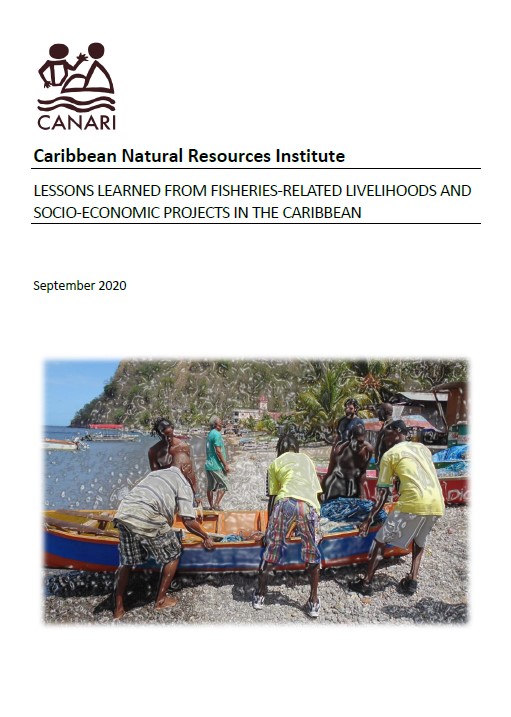
StewardFish Report of Lessons Learned from fisheries-related livelihoods and socio-economic projects in the Caribbean
The “Developing Organisational Capacity for Ecosystem Stewardship and Livelihoods in Caribbean Small-scale Fisheries” (StewardFish) Project which began in 2018 is a Global Environmental Facility (GEF) funded initiative. The goal of this project is to empower fisherfolk throughout fisheries value-chains to engage in resource management, decision -making processes and sustainable livelihoods with strengthened institutional support at all levels in seven small island developing states (SIDS)- Antigua and Barbuda, Barbados, Belize, Guyana, Jamaica, Saint Lucia and Saint Vincent and the Grenadines (CANARI 2019).
Activity 3.1.1.1 under Output 3.1.1 of the StewardFish project aims to learn from the past and adapt in the future by reviewing previous projects and initiatives (PPIs) that focused on sustainable fisheries livelihoods in order to identify best practices and lessons learned. To achieve this, a desk review of sustainable livelihood PPIs in the target countries was conducted.
This reports documents the results of the desk reviews that were undertaken.
Author: CANARI
Year: 2020
Keywords: StewardFish, Fisheries, Livelihoods, Lessons learned blue economy, fisheries
 4
4


 Report issue
Report issue
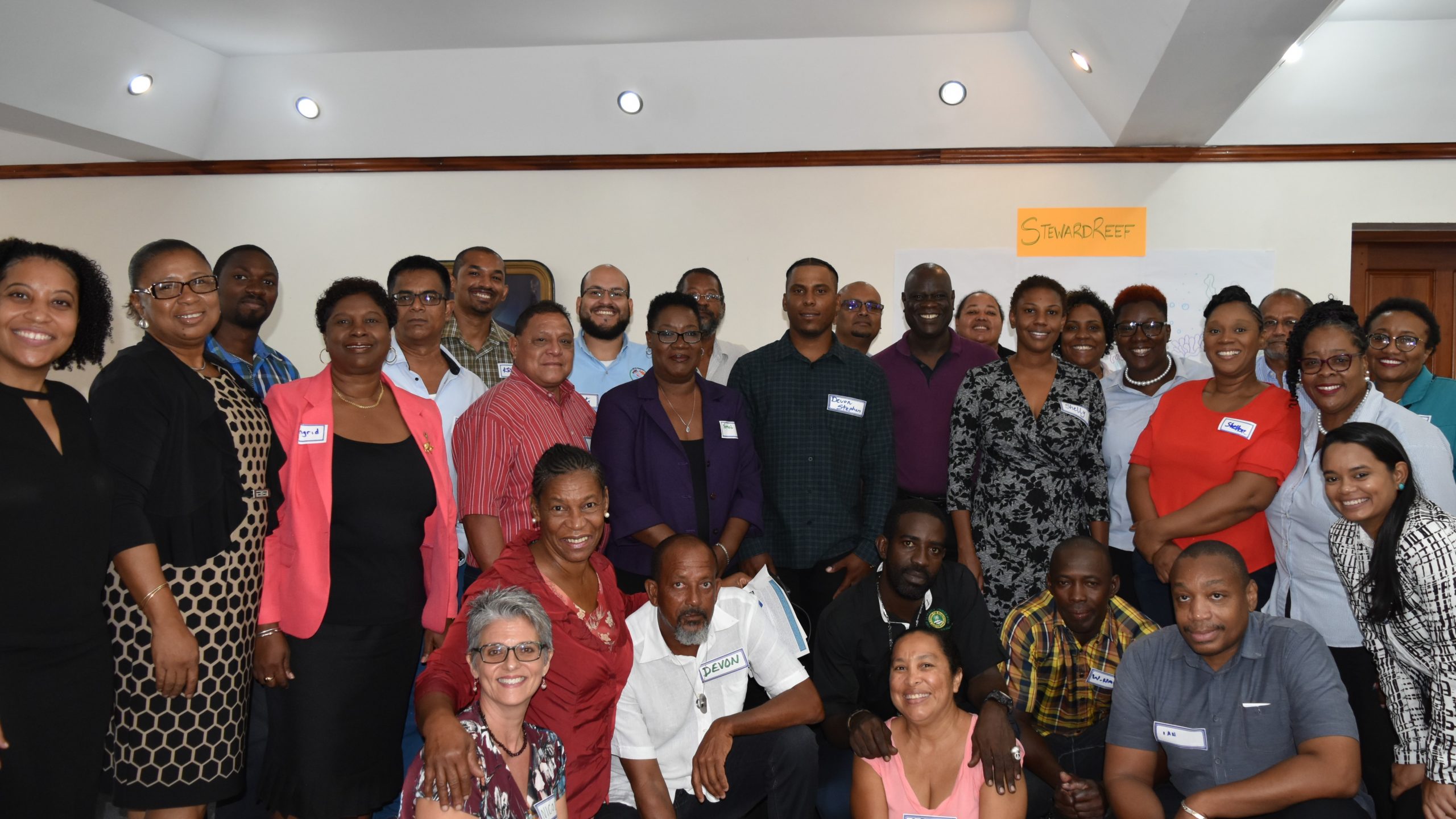
StewardFish Report of the Caribbean FisherFolk Mentors Training Workshop StewardFish Project
Fisherfolk leaders, mentors and representatives of the Department of Fisheries from Antigua and Barbuda, Barbados, Belize, Guyana, Jamaica, Saint Lucia and St. Vincent and the Grenadines participated in the Caribbean Fisherfolk Mentors Training workshop in St. Vincent and the Grenadines from October 29th to November 1st. The workshop was a key activity under the “Developing Organisational Capacity for Ecosystem Stewardship and Livelihoods in Caribbean Small-Scale Fisheries (StewardFish)” project which is funded by the Global Environment Facility (GEF) and implemented by the United Nations Food and Agriculture Organization (FAO).
As one of the co-executing partners of the StewardFish project, the Caribbean Natural Resources Institute (CANARI) is applied an innovative organisational capacity strengthening method to help build the capacity of the national fisherfolk organisations/lead primary fisherfolk organisations that are members of the Caribbean Network of Fisherfolk Organisations (CNFO) in the seven project countries. The method will use trained mentors to deliver a tailored programme of training, mentoring, coaching, action learning and facilitating peer exchanges for organisational strengthening.
At the four-day workshop, mentors as well as fisherfolk leaders and fisheries agency representatives built their capacity to support fisherfolk organisations in three priority areas – financial sustainability, good governance and participatory monitoring, evaluation and learning.
Author: CANARI
Year: 2020
Keywords: StewardFish, Mentorship, Capacity Building Training and Capacity Building, fisheries, governance
 3
3


 Report issue
Report issue
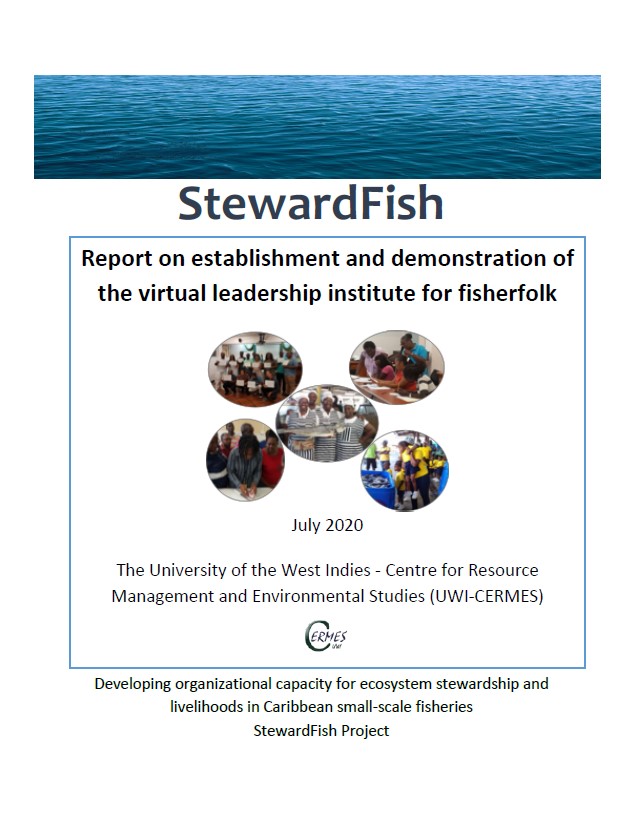
StewardFish Report on establishment and demonstration of the virtual leadership institute for fisherfolk
Developing capacity in leadership is critical to enhancing fisherfolk organizations’ roles in fisheries and marine ecosystem stewardship. A CNFO leadership institute was established in April 2020 through its inaugural session and is currently being demonstrated primarily via an online course. The CNFO, CERMES and FAO agreed that the CNFO should have full and clear ownership of their leadership institute with support upon request from CERMES, but also as needed from other project partners and other allies. Training is the main implementation focus among the areas of the institute, the others being mentoring, discussion forum and library. The three online training sessions to date have been fairly satisfactory, but suggestions for various means of improvement have been made. Observations and recommendations are described in detail but need to be complemented by reports directly from the CNFO. The way forward must focus on monitoring, evaluation, learning and adaptation from the current test course and building the capacity of the CNFO to deliver all four components of the leadership institute. It is not too early to plan for further resource mobilization to support the sustainability of the leadership institute, including drawing in fisherfolk not currently in organizations so as to expand the population from which to seek successors and institutionalize succession planning.
Author: CERMES
Year: 2020
Keywords: StewardFish; Capacity Building; Leadership Training and Capacity Building, fisheries
 4
4


 Report issue
Report issue
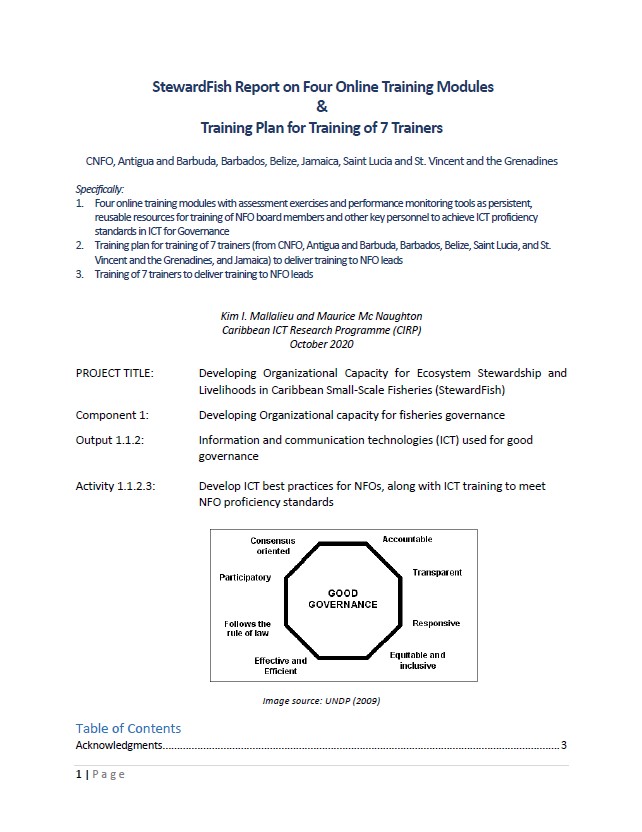
StewardFish Report on ICT Online Training Modules & Training Plan for Training of 7 Trainers
The ICT for Governance (“ICT4G”) course is designed to introduce Caribbean Network of Fisherfolk Organisations (CNFO) and national fisherfolk organization (NFO) leaders to the role that ICT can play in enabling and enhancing good governance in fisherfolk organizations (FFOs); and to identify key required competences. It highlights the role of good governance as a means of efficient and well run FFO organizations at every level and introduces specific ICT tools to enable and enhance good governance.
Author: UWI-CIRP
Year: 2020
Keywords: StewardFish; Capacity Building; ICT Training and Capacity Building, fisheries, governance
 4
4


 Report issue
Report issue
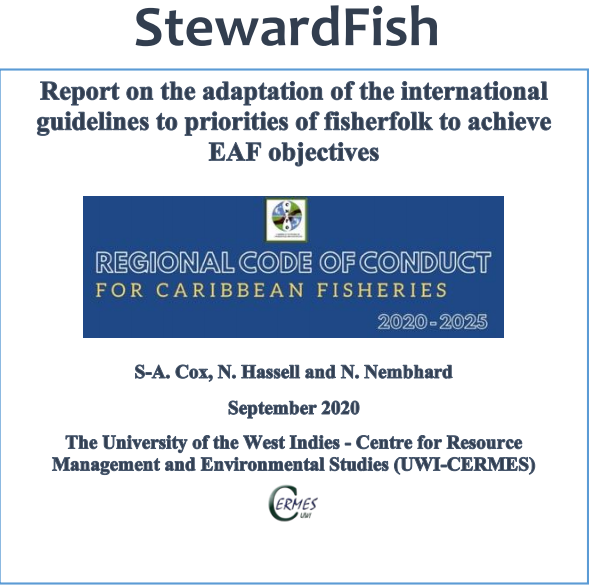
Stewardfish Report on the Adaption of International Guidelines to the Priorities of Fisherfolk to Achieve EAF Objectives
To support operationalization of EAF principles in the Caribbean, StewardFish recommends the
development of both regional and national-level practical EAF Codes of Conduct by and for
persons in the fishing industry. Following a methodology previously used in Barbados to develop
a local fisheries code of conduct, we outline an iterative social learning process of development
for these codes, which emphasizes industry engagement, formal endorsement, implementation
and participatory monitoring and evaluation. This report sets out the development process by
CNFO, CERMES and other regional partners in the co-production of the Regional Code of Conduct
for Caribbean Fisheries. We also address the monitoring and evaluation framework that supports
successful implementation of the Code. Next steps and recommendations suggest actions to
inform the implementation of the regional code and adaptation to the national contexts of the
seven StewardFish countries. Appendices end this report.
Author: Cox, S-A, Hassell, N and Nembhard, N
Year: 2020
Keywords: Fisheries, Governance, Code of Conduct
 4
4


 Report issue
Report issue
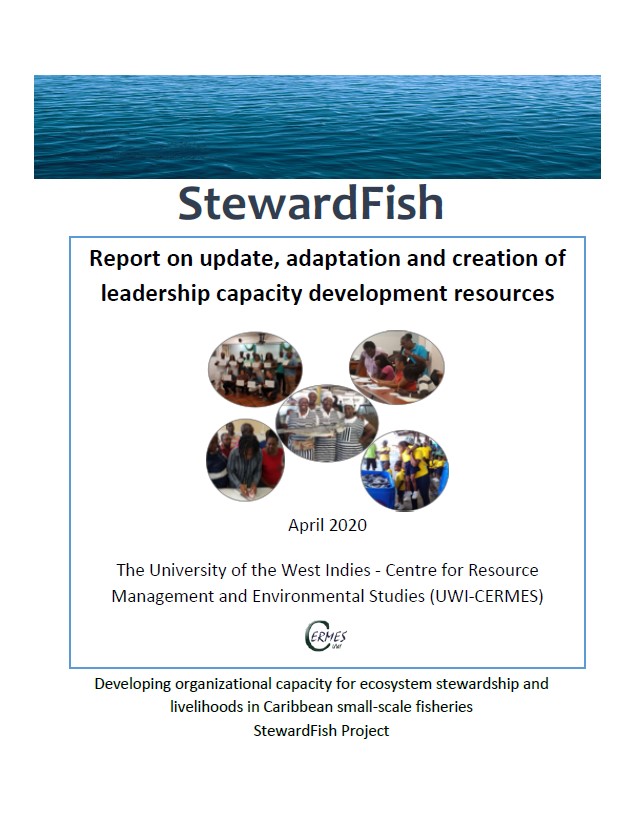
StewardFish Report on update, adaptation and creation of leadership capacity development resources
Developing capacity in leadership is critical to enhancing fisherfolk organizations’ roles in fisheries and marine ecosystem stewardship. A CNFO leadership institute is proposed as a major contributor to building and sustaining such capacity. CERMES is assisting and guiding the CNFO in this quest. Resources for learning have been compiled and made accessible online. The CNFO and CERMES started collaboration on crafting the first sessions of the virtual training. It is likely to use Skype and Google Classroom. However, persistent problems in communication between CERMES and CNFO have constrained CERMES attempts to provide guidance on the basis of full information on fisherfolk leader demands and expectations. Meanwhile CNFO is proceeding with a training design that may be sub-optimal, fuelled by strong ownership of the leadership institute concept. CERMES guidance of the institute’s development may best be offered through demonstration. If this approach is not successful there is a risk of resource wastage, eroding benefits of the developmental process without much learning and progress.
Author: CERMES
Year: 2020
Keywords: StewardFish; Capacity Building; Leadership Training and Capacity Building, fisheries
 3
3


 Report issue
Report issue
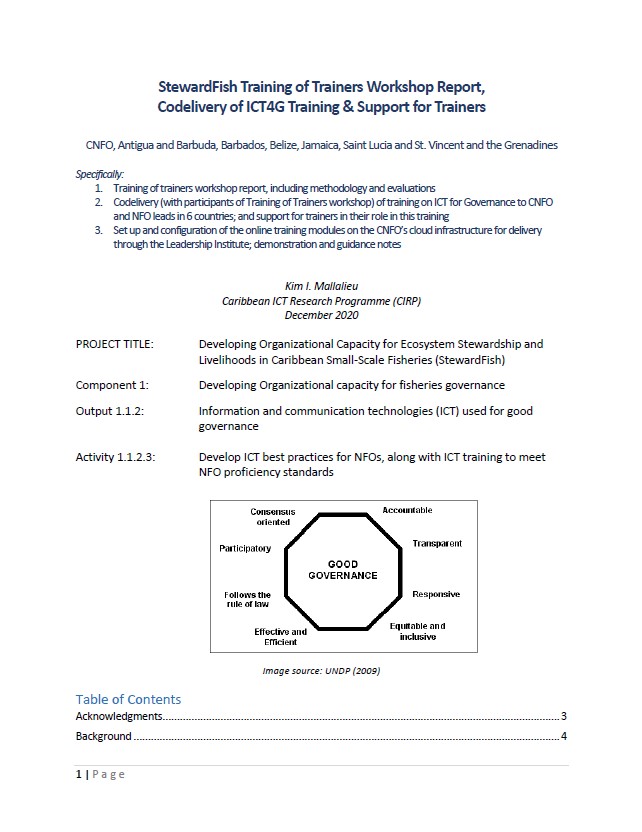
StewardFish Training of Trainers Workshop Report, Co-delivery of ICT4G Training & Support for Trainers
The key training objective for the trainers workshop was to prepare participants to support NFO leads to navigate through, engage with, and learn from the Information and Communications Technology (ICT) for Governance (“ICT4G”) training. This involves the course material platform (either the web edition or the Android app edition , as well as Google Classroom, which is the home to all class aspects of any delivery cycle.
Author: UWI-CIRP
Year: 2021
Keywords: StewardFish; Capacity Building; ICT Training and Capacity Building, fisheries, governance
 3
3


 Report issue
Report issue










